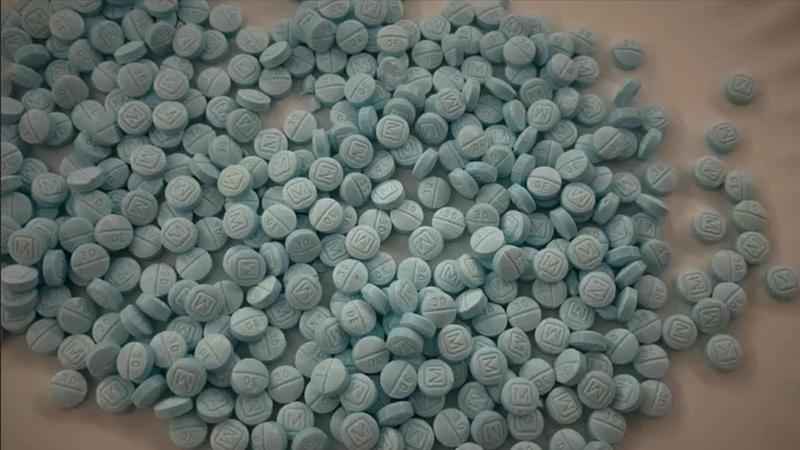‘Hopefully save one person’s life’: 19-year old in long-term substance abuse recovery tries to pay it forward
[anvplayer video=”5057440″ station=”998122″]
Gavin Nelson is paying it forward, one classroom at a time.
"Hi guys, my name is Gavin, I’m in long-term recovery," he told a class at Waconia High School on Friday. "I lost a lot of my goals, I lost my family, I lost a lot of hope in myself."
But the 19-year-old from White Bear Lake has turned that around.
He’s been clean, free of using drugs and alcohol for a year now.
Nelson wants to help other teens, who are just a few years younger than himself, about the hard truths of substance abuse.

"Just kind of educating them on like the reality of drugs and alcohol," he said. "The stuff that we’ve been through, so they don’t make the same mistake of going through what we went through."
Nelson started working as a paid intern for Minnesota Adult and Teen Challenge, a faith-based recovery program, a few weeks ago.
As a youth prevention advocate, he hasn’t shied away from sharing his own personal struggles.
"I overdosed on Oct. 5 of 2020, one of the scariest moments of my life," he told one class. "I got fired and went home and detoxed for a week. That was the start of my recovery journey."
But it was a hard road that began when Nelson started abusing prescription drugs when he was just 13.
By his senior year, he says, it got much worse.
"From doing molly, to doing cocaine, and cocaine to doing meth," Nelson said. "I knew I didn’t want to die, but I also wanted to get high."
Nelson says he also started using garage pills — counterfeit narcotics made with a pill press.
"I was in the wrong place at the wrong time and got onto meth and cocaine that was laced with fentanyl," he said. "I was playing Russian roulette. I didn’t really care what was happening to me, because I was at such a low point in my life, when I died, I died. That’s where my addiction was taking me."
For U.S. Drug Enforcement Administration agents in Minnesota, it’s an all too familiar story.
"We all want to assume that our children will be smarter and not to take a drug or prescription pill that’s not prescribed to them," Angela von Trytek, with the DEA’s Minneapolis-St. Paul office, said.
She says with schools reopening and kids returning to campus life, there’s an added urgency.
"Back to school is a huge issue because we know that college students, high school students have a tendency to experiment with drugs," von Trytek explained. "And that one pill that you take that you think is going to be beneficial for this one moment, that you’re trying to cram for a midterm or cram for a final, could cost you your life."
She says there’s a sharp increase in the supply of counterfeit prescription pills in Minnesota.
The DEA says its agents seized 57,000 illicit pills between January and July of 2021. In all of 2016, agents say they confiscated 2,800 pills.
The biggest problem, von Trytek says, is that there’s no quality control.
"They will look very similar to percocets or what we know as oxycontins, blues, M30s," she noted. "But what you’re going to find out is that in fact, it is not any of that prescription medication at all. It’s a filler product laced with fentanyl."
The Minnesota Department of Health says drug overdose deaths of people aged 15 to 24 increased 26% between 2019 and 2020, from 96 to 121.
For Nelson, those aren’t just numbers. He says his biological father died from methamphetamine and heroin abuse in 2018. A cousin also passed from substance abuse.
Nelson says he’s also lost 14 friends who didn’t know what they were taking.
"Then they take a prescription drug that wasn’t a prescription drug, it was laced counterfeit pill that killed them," he said. "And that’s what’s so hard nowadays with this kind of drug, because you don’t know what you’re getting on the street anymore."
Minnesota Adult and Teen Challenge says it’s partnering with 19 schools this fall for peer-to-peer counseling.
This is their 16th year of classroom outreach. That effort got tougher during the pandemic.
"The impact of COVID-19, right?" said Mika Nervick, the prevention program coordinator for Know the Truth, the prevention program for Minnesota Adult Teen and Challenge. "We’re seeing repercussions of things students went through in the past year. Isolation, lack of parental supervision, not having that time in the schools. Not seeing their school counselors or getting some of those additional resources."
Still, she says the peer-to-peer approach does work, as advocates return to the classroom.
"We talk about lived experiences," Nervick said. "It’s not judgmental, it’s a judge-free zone, just letting them know you’re not the only one going through this. I’ve been there, and I’m here for you."
Nelson says he’s going from class to class and student to student in order to make a difference.
"I’m in it to make that positive impact on my community," he said. "My goal isn’t to save everyone. My goal throughout my lifetime is to hopefully influence one person. Hopefully, save one person’s life."